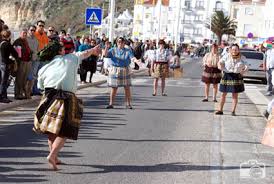
Jogo da Banca ou Pela (Portugal)
- Name of sport (game): Pela game or Bankrol (Box) game
- Name in native language: Jogo da Banca ou Pela
- Place of practice (continent, state, nation):
Portugal
The game of Banca or Pela is umbilically linked to some Portuguese fishing zones, being indicated in the historical records and highlighted in the literature that deals with Lusitanian customs, more particularly of these games, the cities of Nazaré and Vila do Conde. - History:
This game has been shown throughout its development to be exclusive to female practitioners, and the presence of male practitioners was not registered during its development in the Easter period. Currently, we consider this game to be in the process of disappearing, occurring in specific moments for the enjoyment of tourists visiting certain Portuguese fishing areas.
- Description:
The materials needed for the Bank or Pela game are easy to obtain, as they are just a small wooden box and a ball of rags. In addition to these simple game materials, their development has the characteristic of these practitioners wearing the typical attire of varinas of the locations where they are practiced.
This game, whether in the past or today, spontaneously or programmed for tourism purposes, has always been developed by female practitioners. As for the ages of the practitioners, the documentary records show that these players are adult women. - Current status:
Nowadays, we can consider that this game is played by Banca or Pela, due to its spontaneous expression, it is completely disappeared from the streets of the fishing villages, only showing up on certain occasions and due to tourism initiatives. The risk of transmission of the game is questioned by the change in the customs of the varinas, which today are forced to sell fishery products in standardized establishments, and not in the spaces of the streets of the villages where they practiced.
This game is only practiced during the Easter period, spontaneously or through the promotion of the City Councils of certain fishing villages, or as an attraction for tourist groups visiting these municipalities that still practice it. - Contacts:
This game is not linked to any type of associative entity, occurring spontaneously by practitioners exclusively female during the Easter period, and in certain fishing areas.
- Sources of information :
Text and photos:
Paulo Coêlho Araujo, Vice President of AEJeST - Gallery:

